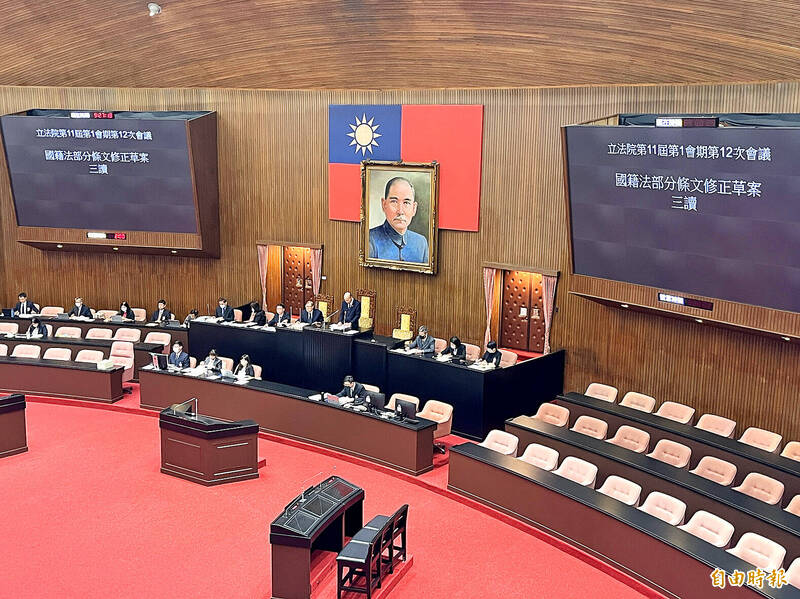《TAIPEI TIMES》Legislature passes change to rules for naturalization

Legislators pass an amendment to the Nationality Act in Taipei yesterday. Photo: Lee Wen-hsi, Taipei Times
BOOST TO SPORTS? The Executive Yuan said that the amendment was introduced to attract professionals to Taiwan, and increase the incentives for naturalization
By Shelley Shan / Staff reporter
The Legislative Yuan yesterday passed on third reading an amendment to the Nationality Act (國籍法) that would reduce the minimum residency period required for highly skilled professionals to apply for naturalization from three to two continuous years, with a minimum of 183 days in Taiwan each year.
The 183-day requirement does not apply if an eligible applicant has lived legally in the territory of the Republic of China for more than five continuous years.
Taiwan’s professional basketball leagues are expected to benefit from the amendments, which would allow them to recruit more players from overseas.
Prior to the passage of the amendment, the national basketball association had petitioned the Ministry of the Interior and the Sports Administration to allow naturalization after just a two-year stay after taking into account players’ performances to facilitate recruitment of foreign players.
New Taipei Kings forward Quincy Davis and Hsinchu Lioneers forward William Artino became naturalized Taiwanese using the same model, the association said.
The Executive Yuan said the amendment was introduced to attract foreign professionals and talent to Taiwan, and increase incentives for naturalization, adding that the requirements on the length of stay are relaxed for applicants, who would not be asked to relinquish their original nationalities.
Based on the amendment, foreigners who are deemed to be senior-level professionals following a review by the Ministry of the Interior would be eligible.
Foreigners or stateless people who have made outstanding contributions to Taiwan are exempt from the application fee.
To address issues arising from the uncertain status of non-Taiwanese nationals, the amendment also allows stateless children to apply for naturalization with assistance from social welfare agencies or institutions, through which they can access social welfare services, medical care, schooling rights and other protections.
Meanwhile, as the Civil Code has lowered the age of majority to 18, the amendment also states that naturalized people can apply for naturalization for their “unmarried children who are under 18 years old,” rather than “children who are minors.”
Democratic Progressive Party Legislator Lo Bi-ling (羅美玲) said that many countries have recruited naturalized citizens whose expertise boost their prowess in sports and other disciplines, particularly when they face challenges of an aging society and labor shortages.
“Hopefully, the change would encourage more people to become naturalized citizens,” Lo said.
新聞來源:TAIPEI TIMES











